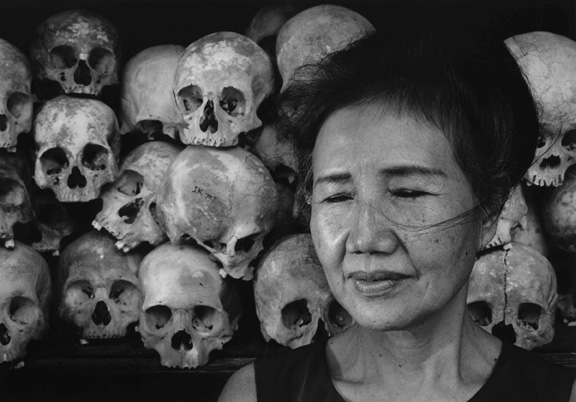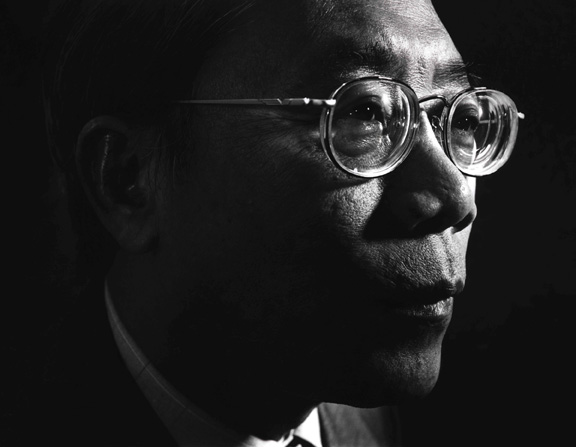December
2006/January 2007
Featured
Photography Project: Speak Truth to Power
|
Speak Truth to Power by Kerry Kennedy, photographs by
Eddie Adams, edited by Nan Richardson (New York: Umbrage Editions, Crown
Publishers, 2000).
$50 hardcover; $34.95 paperback. 256 pages.
The book Speak Truth to Power, contains interviews by Kerry Kennedy with
50 human rights advocates from more than 35 countries and five continents,
accompanied by portraits by Pulitzer Prize-winning photographer Eddie
Adams. Kennedy examines the quality of courage of women and men who are
dramatically changing the course of events in their communities and countries.
Yet, each faced overwhelming state-sponsored terror, torture and death
with dignity and moral courage.
Over the past several years, Speak Truth to Power has grown from a book to the
moving and inspirational play by esteemed Chilean writer Ariel Dorfman, the stirring
photographic exhibition by Pulitzer Prize-winner Eddie Adams, a PBS documentary
film, an education packet, and five public service announcements on Court TV.
The play has been produced to acclaim in Geneva, London, Helsinki, Athens, Madrid
and Sydney, among others. The exhibition of 51 portraits has toured four countries
and over 20 cities across America.
Most importantly, Speak Truth To Power is a non-profit organization seeking to
proactively engage the general public in an ongoing series of issue-related programs
and events, bringing human rights activists and their work into contact with
ever-increasing audiences.
“ We are the stories we tell,” a great American writer once observed,
and the power of these heroes is the proof they give with their own lives and
actions that one voice, one drop of conviction, one belief in truth and justice
can indeed start a river of hope and change.—Nan Richardson, Executive
Director, Speak Truth to Power
For more information visit www.speaktruth.org. Photos and text reprinted with
kind permission.
 |
Kek Galabru, Cambodia
Political Participation and Children’s Rights
Born on October 4, 1942, Kek Galabru received her medical degree
in France in 1968. She practiced medicine and conducted research
in Phnom Penh from 1968 to 1971, and continued her work in Canada,
Brazil, and Angola. In 1987–1988 Galabru played a key role
in opening negotiations between Hun Sen, president of the Cambodian
Council of Ministers and Prince Sihanouk of the opposition. That
led to peace accords ending the civil war in 1991 and elections held
under the auspices of the United Nations. Galabru founded the Cambodian
League for the Promotion and Defense of Human Rights (LICADHO) during
the United Nations transition period. LICADHO promotes human rights,
with a special emphasis on women’s and children’s rights,
monitors violations, and disseminates educational information about
rights. During the 1993 elections, LICADHO’s 159 staff members
taught voting procedures to 16,000 people, trained 775 election observers,
and produced and distributed one million voting leaflets. Since then,
LICADHO continues to monitor abuses, provide medical care, legal
aid, and advocacy to victims, as well as offering direct assistance
to victims of human rights violations. |
 |
Doan Viet Hoat, Vietnam
Political Rights and Imprisonment
Doan Viet Hoat protested the South Vietnamese government’s
suppression of Buddhists in the 1960s while still a student, and
was then forced to leave the country, during which time he received
his doctorate in the United States. By 1976, when North Vietnam took
over South Vietnam, Hoat was back. But the new authorities embarked
on mass arrests of intellectuals, and Hoat spent the next 12 years
confined to a cramped cell, shared with 40 others. Upon his release,
Hoat began publishing an underground magazine, entitled Freedom Forum.
Only months later, he was detained without trial for two years, then
in March 1993, sentenced to 20 years in prison for, “attempting
to overthrow the people’s government.” Throughout his
imprisonment, Hoat continued to issue statements on democracy and
to offer criticism of the regime that were sent out of the prisons
clandestinely. The Vietnamese government transferred Hoat from one
detention center to another, in an attempt to silence him, but everywhere
he went, Hoat’s charismatic temperament won over fellow prisoners
and guards alike, who sought his counsel and carried out his letters.
Finally, Hoat was sent to the most remote prison in the country,
and all prisoners were removed from the cells adjacent to his own.
He spent five and a half years in solitary confinement until, in
September 1999, after intense international pressure, Doan Viet Hoat
was released, then exiled. He now lives in the United States. |
| |
|
|
| © STEALTH TECHNOLOGIES INC. |
|
|


